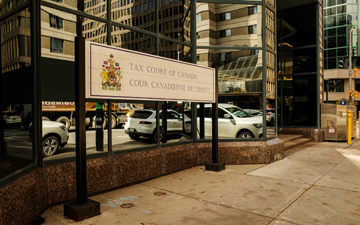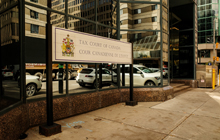When late filing penalties apply under subsection 162(7), one's track record of respecting CRA filing deadlines matters

The recent Tax Court of Canada decision in Laurie v. the King highlights the narrow scope of the due diligence defence in regards to late-filed T1135 forms
Foreign Property Reporting and the CRA's Approach to T1135 Penalties
 |
David J Rotfleisch, CPA, JD is the founding tax lawyer of Taxpage.com and Rotfleisch & Samulovitch P.C., a Toronto-based boutique tax law corporate law firm. |
Subsection 162(7) of the Income Tax Act authorizes the Canada Revenue Agency to impose penalties when taxpayers fail to file information returns, including Form T1135 (Foreign Income Verification Statement), on time. The CRA uses this form to gather details about foreign assets and properties held by taxpayers above certain thresholds.
If it is not filed on time, a penalty of $25 per day is calculated, up to a maximum of $2,500 per year. Canadian courts have recognized that taxpayers may invoke a due diligence defence (i.e., showing that they took all reasonable steps that a prudent person would take to comply) under subsection 162(7).
In Laurie v. The King (2025 TCC 130), the Tax Court of Canada reviewed whether a taxpayer who failed to file her T1135 forms for 2019 and 2020 could rely on due diligence to avoid the T1135 late filing penalty. The taxpayer argued that she had carefully managed her compliance obligations and had relied on her understanding of foreign property rules.
The CRA emphasized her history of prior non-compliance and maintained that she failed to act as a reasonable person would, given that she had already required a voluntary disclosure for the same omission in earlier years.
The Tax Court agreed with the CRA, concluding that, although a due diligence defence is in principle available under subsection 162(7), it was not met in this case because the taxpayer repeated the same mistake after being alerted to the issue.
This decision highlights the narrow scope of the due diligence defence in the context of late-filed T1135 forms. Taxpayers must not only demonstrate that their mistake was genuine but also that they took proactive steps to avoid repeating the error once identified.
The case serves as a cautionary reminder that recurring omissions will rarely be excused.
Repeat Failure to File T1135: A Costly Lesson in Due Diligence
Sherry Laurie, a Canadian taxpayer and former U.S. citizen, owned specified foreign property exceeding $100,000 in 2019 and 2020. As a result, she was required to file the T1135 Foreign Income Verification Statement for those years. She did not file the forms on time. The CRA assessed late-filing penalties under subsection 162(7) of the Income Tax Act, imposing the maximum penalty of $2,500 for each year that the return was late.
This was not her first lapse, because between 2012 and 2014, Ms. Laurie failed to file T1135s. However, her accountant corrected the issue through a voluntary disclosure in 2015, which the CRA accepted, sparing her from penalties.
After relinquishing her U.S. citizenship in 2018, she stopped using an accountant and prepared her own tax returns. However, she mistakenly believed, based on her own research and confusion with tax software definitions, that her U.S. investments held in a Canadian brokerage account did not require reporting on Form T1135. Consequently, she did not verify whether the total cost of those investments exceeded the reporting threshold.
In 2019, her new broker's strategy increased the cost base of her U.S. investments above the $100,000 threshold. However, she repeated the same mistake by not filing T1135 forms for 2019 and 2020. When preparing her 2021 return, she received new brokerage documentation that alerted her to the omission. She attempted another voluntary disclosure, but the CRA rejected it because she had already disclosed the same type of non-compliance before.
The Tax Court of Canada confirmed that, although a due diligence defence is available under subsection 162(7), it did not apply in this case. Having already been warned by prior non-compliance, a reasonable taxpayer would have taken extra precautions. The Court concluded Ms. Laurie was not duly diligent and upheld the penalties.
No Second Chances on T1135 Compliance
In this case, the Court accepted that a due diligence defence is available under subsection 162(7), but it found that Ms. Laurie could not rely on it.
There are two ways that a taxpayer can satisfy a due diligence test (Les Residences Majeau Inc. v. The Queen). Taxpayers can demonstrate that they took reasonable precautions to prevent the event that led to the imposition of the penalty.
Alternatively, taxpayers can demonstrate that they were mistaken regarding a factual situation that, if it had existed, would have rendered their mistake innocent. However, in this alternative case, the taxpayer must also show that it was a mistake that a reasonable person would have made in the same circumstances.
Nevertheless, having already been through a voluntary disclosure for the same omission in the 2012–2014 tax years, she was expected to exercise greater care. The case stresses that a reasonable person would have been put on alert to the risks and would have taken careful steps to make sure he or she did not fall into the same trap again.
Ms. Laurie did the opposite. She stopped using an accountant and returned to preparing her own tax returns. Thus, by preparing her own tax returns without revisiting her T1135 obligations, she failed to act reasonably in the circumstances.
The outcome underscores two important lessons. First, the CRA will not excuse repeated mistakes, particularly when a taxpayer has already been warned of the same issue. Second, once a compliance problem has been identified, taxpayers must adopt stronger safeguards.
In this case, the Tax Court made it clear that prior voluntary disclosure placed the taxpayer on notice, and failure to take precautions meant that the due diligence defence could not be successful.
For Canadians with foreign property, the best safeguard is early tax planning and consultation to avoid costly penalties and ensure that any defence before the CRA is presented effectively.
That said, not every case will produce the same result. The Tax Court emphasized that due diligence is available, but it must be supported by credible evidence of reasonable steps taken to comply. In other circumstances — where the error is genuinely isolated and supported by proper documentation — the defence may succeed.
The Laurie decision confirms that, while a due diligence defence under subsection 162(7) remains available, taxpayers who repeat the same omission after a prior warning will face significant hurdles. The case highlights the importance of taking each compliance obligation seriously and ensuring that lessons from past mistakes are not overlooked.
David J Rotfleisch, CPA, JD is the founding tax lawyer of Taxpage.com and Rotfleisch & Samulovitch P.C., a Toronto-based boutique tax law corporate law firm and is a Certified Specialist in Taxation Law who has completed the CICA in-depth tax planning course. He appears regularly in print, radio and TV and blogs extensively.
With over 30 years of experience as both a lawyer and chartered professional accountant, he has helped start-up businesses, cryptocurrency traders, resident and non-resident business owners and corporations with their tax planning, with will and estate planning, voluntary disclosures and tax dispute resolution including tax audit representation and tax litigation. Visit www.Taxpage.com and email David at david@taxpage.com.
Read the original article in full on Taxpage. Author photo courtesy Rotfleisch & Samulovitch P.C. Title image: iPicture from Pixabay.











(0) Comments